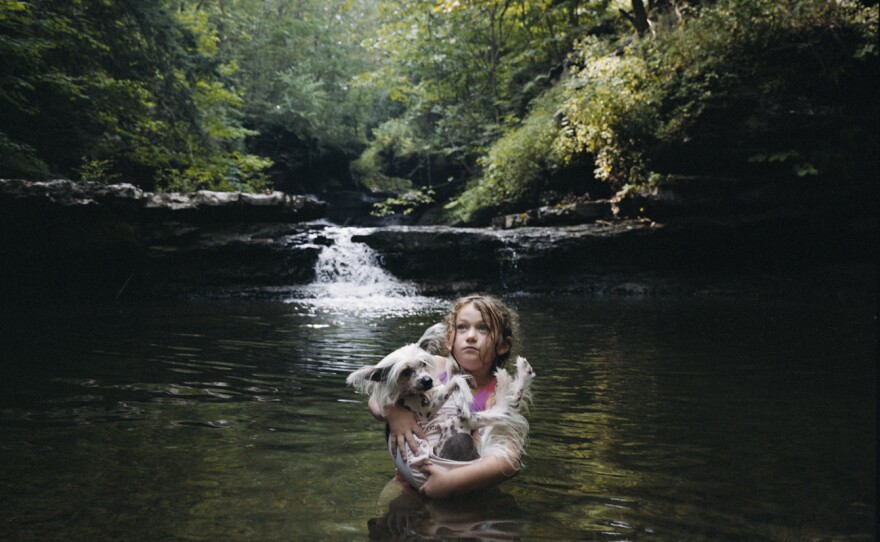Thistle and Brownie were recently the special guests at a small exhibit in Charlottesville, Va. Neither cared much for the art. It's rumored, in fact, that they didn't even deign to look. No matter to the gallerist, who seemed unfazed that these two guests might even defecate right on her floors. And the artist, Robin Schwartz, wasn't the slightest bit offended by their nonchalance.
Only at a Robin Schwartz exhibit would guests like Thistle the rabbit and Brownie the Pomeranian be the center of attention.
Schwartz had just given a presentation of her work at the Look3 photo festival. And afterward, well, if you can't imagine what a bunch of photographers and animals crammed into a small gallery space looks like, I'll tell you: a total zoo.
A few days after the pandemonium, I caught up with Schwartz and her daughter, Amelia, by phone to discuss their ongoing collaborative series, , now in its 10th year.
It all started somewhat accidentally, when Amelia was 3. Schwartz's projects had always been about animals. (Her two other books are Like Us: Primate Portraits and Dog Watching.) Then she noticed how her daughter naturally took to animals — like Ricky the chimp: "They fell off the chair hugging each other," Schwartz recalls. That spontaneous moment inspired a decade of similar posed scenes.

Through all the growing pains, this project has been a constant. For Schwartz, a photography professor by day, the project actually kills three birds with one stone: She can practice her craft, put a tidy frame around the complications of motherhood and meet interesting animals along the way. For Amelia, who has no desire to be a photographer, it's all about the latter. She wants to be a primatologist some day.
One might infer, based on Amelia's deadpan expression in the photos, that she's just putting up with it all — with her mom's wacky ideas and with the animals that heckle her. But actually, she's been described as an animal whisperer; and Schwartz is adamant that this is something Amelia wants to do.
"She's really, really good with these animals," says Schwartz. "The goal is for her to get something out of it."
Over the years, Schwartz has cultivated relationships with zoos and animal owners, which is how they got access to Shiba the elephant and Lorenzo the baby tiger, for example.
"Everyone that watches her be photographed says she has a lot of tolerance," Schwartz says of Amelia. "She is pretty quiet, and these days are long, and sometimes you end up with a goat butt in your face or something — or being pooped on — and so I have to be reminded that she's tremendously tolerant."
Schwartz describes them — herself, her husband and Amelia — as an animal family. Her own personal affection has roots in her days as a "latchkey kid," when her only company while her parents worked was a cat.
"I think Amelia doesn't realize how different her childhood is," she says. "I mean, how could she?"
Schwartz recalls her own mom taking her to Orchid Street in Manhattan to buy toys; she still has the little stuffed monkeys she got that day. Naturally, that relationship has a lot to do with how she connects with Amelia.
And, over the past few weeks, it has been a particularly poignant connection. Amelia just celebrated her Bat Mitzvah, a Jewish ritual marking the passage of a girl into religious adulthood. The usually wry Schwartz shared her remarks to Amelia with me:

"I first saw your ability to be compassionate and face illness when you were just 3, how you interacted with your grandmothers, both who passed away that year. You know, their passing is the reason for our photo project. I am grateful that for 10 years of this project, you have been more tolerant than I ever give you credit for. This summer I will be the same age my dad was when he died. Photography is our connection through time and my legacy to you."
There has been some criticism about the peculiarity of this collaboration — or that it might go to Amelia's head. But Schwartz insists that it's not only playful, but also constructive. She has inadvertently created a surreal safe haven for herself and her daughter. And if Amelia doesn't want to participate, she doesn't have to.
"She has her own mind," Schwartz says repeatedly.
And over the phone, some mature words come from Amelia. You'd half expect it from the girl who has such a quiet command in these photographs; though her voice, at the end of the day, is still unequivocally childish in pitch and tenor.
"I want to make money," she says softly. "I see that my parents are artists, and I don't want that."
I asked Amelia if all of the recent attention — galleries, lectures at National Geographic, invitations to Spain, etc. — make her mom seem somehow cooler. "No," she says earnestly. "I already thought she was cool."
In fact, they both describe themselves as lacking confidence. But as someone who would be loath to pet a skunk, I beg to differ.
Copyright 2021 NPR. To see more, visit https://www.npr.org. 9(MDA4NjIwNTkwMDEzMjI4NDY0MjY4ZTBlNA004))
























